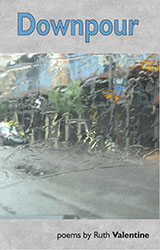Downpour
Ruth Valentine
Price: £7.95

Ruth Valentine has worked as an undertaker and as a celebrant at secular funerals. In this new collection she draws on her experiences to compose an extended meditation on dying and death, its emotional grammar and its painful but necessary rituals. Bleak and brave, serious and sad, Downpour is an unflinching study of the physical realities of dying. Bodies are prepared for burial, coffin lids are closed, and scattered ashes sail downriver. An old man’s coffin enters the furnace, his memories becoming part of the wider world. The invisible dead joy-ride through London at night and the disinterred dead stir in Bosnia and Baghdad. Valentine explores the geography of death – hospital corridors and waiting rooms, winter tides, tearful winds and rain-swept cemeteries – and considers the strangers – doctors, mortuary assistants and undertakers – who must escort us towards oblivion, conscious of ‘their own death and your death, / the death of the planet and the death of hope’.
Author photo: Alan Howard.
Cover photo: Mimi Sanderson.
In the gutter, the dead fox remembers grey light through the slatted shed in the early morning, smell of dead leaves, chicken bones, nettles. He lies on his side, very neatly, facing west, his fur all the colours of seasoned wood, shadow along his back where the car hit him. He feels himself stream through a garden fence into a sunlit bed of yellow poppies although he’s dead. Soon someone will come from the nearest house, with a shovel. While he can he pulses out a message to the children on their way to reception class. They stop and listen.
This woman so short of breath no longer needs it, like someone who was always short of money but wins the lottery and moves away to a big brick house with chauffeur and swimming-pool. The air that hovered just beyond her shoulder has burned itself up in the back-room fiery furnace; like Shadrach, Meshach and Abednego she has been cast to the flames but not destroyed. Now finally we see who she really is: small girl skeetering down a hillside street, young woman at an island festival, her baby in her arms, dancing all night.
First the coffin burns, then everything you recognised as him, his hair, the skin of his hands, is vaporised, two-thousand-degree unanswerable blaze. The segments of his brain, that once lit up an MRI scan, now illuminate the brick walls of this kiln, which is creating something new from the old form of his being, since matter cannot destroy itself, but is reclaimed. When you take the urn in your hands and feel the weight of him shift, you realise what you knew as him, what you woke beside at night, is somewhere else, not as in afterlife, but as in the cold air in the avenue of plane-trees outside, the gold leaves darkening on the grass, the squirrel leaping into winter.
Then in that moment everything he’s seen in eighty-five years spills out from his eyes into the winter air, like snow falling steadily out of nothing, so the sky has gone, and the trees are blurred, and the terraced houses – school, and the days he skived off down the market, the mountain village in wartime, scavenging, his wife as he bent towards her by the fire – all of it rushes out into the space his consciousness has abandoned, till this man is him and not-him, the muscle-memory – chopping wood, carving a joint of meat – disperses like snowflakes at night, into the neighbourhood and beyond, so on a hill-farm a woman finds she can quiet the ewe, ease out the twin lambs.
I am organising the service for the lost: the Italian men from Glasgow and Clerkenwell interned in 1940, shipped unescorted across the Atlantic: for the men who tried to swim and couldn’t, men who were holding on till they couldn’t hold on. This is their funeral. For eleven hundred and twenty-nine garment workers, who told the boss there were cracks in the tall building, were told not to worry and did, but went back up to their sewing machines and cutting-out machines and were working in noise and cotton-dust when the building fell in around them, concrete and cloth and cries. For the man who dropped out of the landing-gear of a plane from Angola as it came in to land at Heathrow. For his hopes and his ignorance, his family and his courage and the moment the undercarriage cold gathered him up into itself and soothed him to a deep unshakeable sleep. For the pavement where they found him. Also for this woman present, with tired blue eyes.
‘In the title poem of this moving new collection, Ruth Valentine reaches for “some implausible quiet place” Her search takes her through cityscapes and conflict zones, often finding it in interiors, both physical and mental. Many of the poems are concerned with the silent realm of death, eloquently bridging the space between this world and the next. She speaks her empathy and compassion for humanity in poems that are always precise but lyrical.’
Tamar Yoseloff
‘Valentine is a formidable poet at the height of her powers. The poems shine with her close and specific observations of the world. She is always in control of the line and language, and the words lift “as melodious as love” with their own music.’
Hannah Lowe